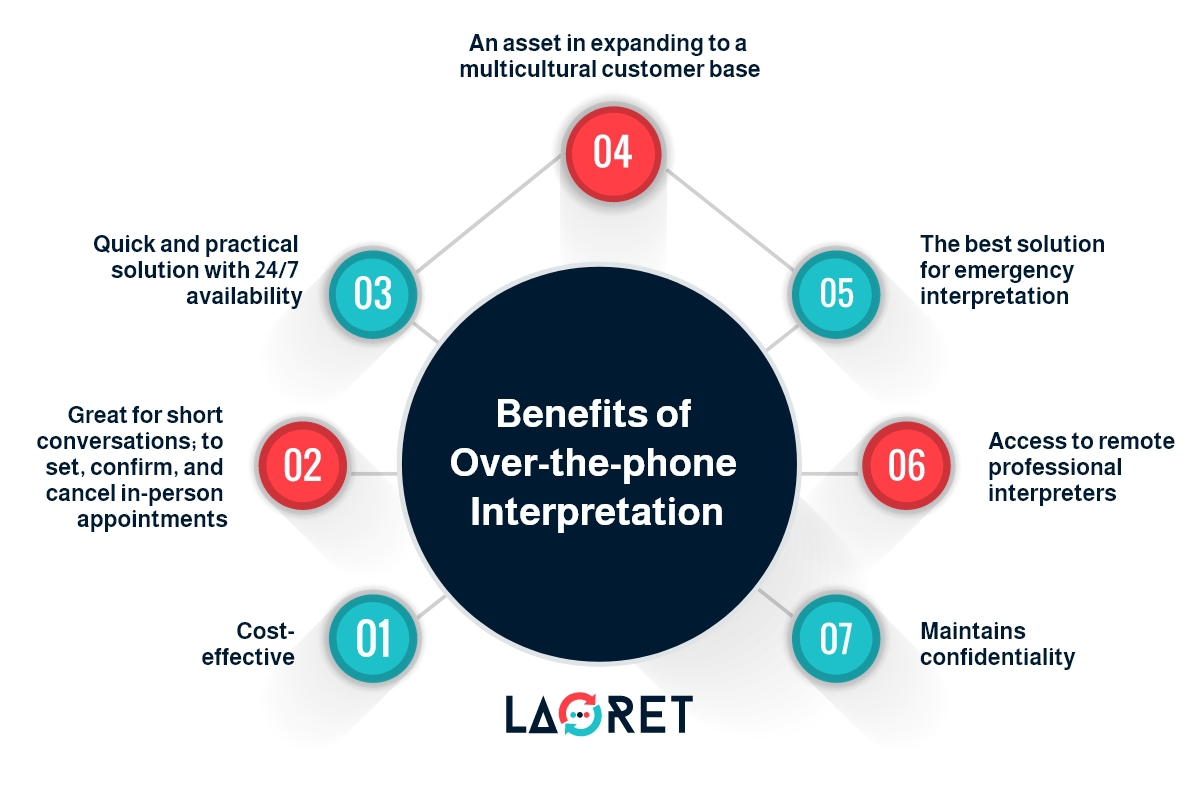Here’s Why You Need Over-The-Phone Interpreting Services in 2023
Although the surge in over-the-phone interpreting did come as a necessity to adapt to the global pandemic of Covid-19, a growth tendency was evident before the pandemic as well.
According to Statista, the virtual interpreting services market nearly doubled between 2012 and 2019. That means that businesses were already seeing the benefits of virtual interpreting services and were favoring them more and more.
Another study found that, while revenue for on-site interpreters decreased during the pandemic, it increased for interpreters who provide virtual interpreting services, with over-the-phone interpreters experiencing the greatest increase in revenue by 18%.
In this article, we make a case for over-the-phone interpreting and why you should actually choose it over other types of interpreting.
What’s Over-the-phone Interpretation (OPI) and How Is It Different from Other Types?
During over-the-phone interpretation, the sender of the message, the interpreter, and the audience are not in the same physical space, and all communication is done remotely.
OPI consists of three-way phone calls which allow a client and a customer, for instance, who do not speak the same language to communicate. Following consecutive interpreting, the interpreter waits for the speaker to pause to then translate to the other party, taking thus turns.
Professional interpreters who provide OPI services should have extensive oral translation experience, excellent communication skills, and subject-matter expertise. It’s a much better solution in many situations where the customer can’t communicate directly with your representatives, which often leads to informal interpreting.
In healthcare, for example, it’s not uncommon for family members to translate medical information for the patient. However, as many studies show, this increases the likelihood of errors and compromises healthcare quality.
Key Differences between On-Site, Over-the-Phone (OPI), and Video Remote Interpreting
On-site
- In-person interpretation is usually booked in advance.
- The interpreter listens and then interprets what the speaker says to the customer.
- Has higher costs which include accommodation and commuting costs of the interpreter.
Over-the-Phone (OPI)
- Ideal for on-demand needs, and responding to any request for communication on the spot.
- Doesn’t have extra fees.
- Very practical and efficient for small and urgent tasks.
- Preserves confidentiality
- More impersonal since the parties do not see each other’s body language.
Video Remote (VRI)
- It requires an appointment, but it can also be offered on demand.
- Relies on an internet connection.
- Bridges the gap between in-person and over-the-phone interpretation.
- Inclusive, used to communicate with deaf and hearing-impaired people.
4 Multifaceted Benefits of Over-The-Phone Interpreting Services
More and more people are turning their eyes away from actual stores to online purchases, which have 24/7 availability, save time, and reduce crowds. Imagine having the opportunity to reach new audiences in a new market through over-the-phone marketing campaigns that translate your product into a new language and culture.
Giving your local audience the option to call and communicate in real-time in their own language with your representatives gives you a competitive edge that many industries are taking advantage of.
But over-the-phone interpreting is not only a service that can help you generate more leads and sales. In fields like healthcare, legal, finance, and insurance, which are related to the health, well-being, and safety of people, granting language access to people is an obligation by law.
For example, the Civil Rights Act of 1964 in the USA states that limited English speakers (LEP citizens) have a federal right to interpretation for free, and denying it is considered discrimination. So, keep in mind that if your service might interfere with the customer’s health and safety, it’s better to make sure that all your leads and customers are satisfied with your customer service.
-
Convenient, practical, and quick solution for multilingual customers
One of the great benefits of over-the-phone interpretation is its practicality. The process starts when the provider of services or customer needs to speak about something related to the service. The client then hires an interpreting service provider to facilitate conversations with customers that have limited English proficiency.You can contact your language service provider 24/7 and get professional interpreters according to your needs in a short period of time. Especially if your business requires continuous interpreting services, OPI can meet the needs regardless of time zones, language pairs, or subject matter.
-
More cost-effective
OPI services are the most cost-effective type of interpretation because there are no travel costs for the interpreter to arrive at the location, and no extra costs or extra time wasted to arrange the interpreter’s setup.You can engage only interpreters for the language you need on demand, without hiring multiple interpreters and paying them constantly even though you’re not using them all the time.
-
Effective for short conversations, daily tasks as well as emergencie
Over-the-phone interpretation has already proven its usefulness in legal and medical settings for years, providing quality interpretation at the push of a button to families, businesses, and professionals.Telephone interpreting also has the advantage of being easily accessible even in the most distant locations. With simple phone calls, you can defy any border at a lower cost.
-
Preserves professionalism and confidentiality
OPI eliminates the ability to use facial expressions or to create a warmer relationship between parties but preserves impartiality and confidentiality, which is very important for the main industries where telephone interpreting is used. You can closely work with the language service provider by letting them know the time, theme, topic, language, and so on. They’ll also call to inquire about the context of your call. This is done to ensure they choose the best interpreter for the case.People may argue that interpreting over the phone is cold and impersonal and that it does not foster good relationships between customers and businesses. But a 2010 survey conducted on 240 Spanish-speaking patient volunteers, 24 health providers, and 7 interpreters doesn’t agree. According to it, patients did not notice a significant difference. The fact that the message was delivered was far more important to them, and they appreciated the convenience and practicality of over-the-phone interpreting.Lastly, despite the fact that it is easily mitigated, OPI does exclude people with hearing impairments. Nonetheless, that can be solved by scheduling a video call between the parties.
Benefits of Over-the-phone interpretation
- Cost-effective
- Great for short conversations; to set, confirm, and cancel in-person appointments
- Quick and practical solution with 24/7 availability
- An asset in expanding to a multicultural customer base
- The best solution for emergency interpretation
- Access to remote professional interpreters
- Maintains confidentiality

6 Industries with High Demand for Over-the-Phone Interpreting Service
Over-the-phone interpreting is used in a variety of industries and can cover different needs from generic interpretation such as appointment setting, to interpreting that requires more subject-matter expertise such as technical consultations. Below we explain how OPI is used in some specific industries:
-
Healthcare, Pharmaceuticals, and Medical
OPI is used for patient-doctor consultations, allowing non-English speaking patients to communicate with their healthcare providers. Healthcare facilities can breathe better and increase their capacities by offering over-the-phone medical interpreting services consults, and communication. That, of course, in times when it won’t compromise the quality of the service provided.It is critical that the doctor and the patient communicate clearly in order to properly diagnose medical conditions and provide the appropriate treatment, prescription, etc.
-
Legal
Everywhere around the world, OPI is an obligatory service used in legal proceedings, such as court hearings and attorney-client consultations, to facilitate communication between parties who speak different languages and guarantee the rights of people with language barriers. Since it is indeed a serious matter that doesn’t allow for mistakes and requires precision, people who are not comfortable expressing themselves in a certain language should be given the option to receive and deliver messages in their native language.
-
Banking & Finance
Banks and other financial institutions must now negotiate and deal with clients from all over the world as a result of the global economy. Financial transactions require a deep understanding of legal notions and terms, which often becomes harder for people who don’t speak the same language.
-
Insurance
Over-the-phone interpreters help people with language difficulties understand the complexities of getting insurance, fill up insurance forms, and learn more about the rights and duties that come with each insurance agreement. Customers should be offered over-the-phone interpretingservices to help them navigate any question they might have about their health, life, home, or work insurance.
-
Customer Service
Businesses that offer customer service for third parties is growing annually. And it is one of the industries that use OPI the most. Otherwise called call centers, these businesses organize communication with customers all over the world through telephone interpreting. From marketing calls to inquiries and support, keeping in touch with customers through phone calls has proven to be very efficient and productive.
-
Government
Language barriers are the leading cause for people who don’t speak the official language of countries or have language difficulty receiving substandard services. As such, OPI is used in government agencies, such as immigration and social services, to assist people with language difficulties.We compiled the ultimate virtual interpreting checklist you can use whenever you want with a simple download.
Download our comprehensive checklist
Never worked with healthcare interpreters before?
FAQ
What are the advantages of technical translation?
If you cooperate with a technical translation agency to translate technical documents with interest to your target audience, you’ll:
- Build trust and authority which will convert to more sales.
- Increase your profit, brand awareness, and reach.
- Become a pioneer in markets where the said industry isn’t saturated.
- Remain compliant with local regulatory guidelines.
- Connect with foreign audiences by offering valuable technical expertise.
Conclusion
If you want to exceed your level of professionalism, language barriers are the most important hurdle to overcome when dealing with multicultural audiences. However, choosing the wrong provider can cause a lot of problems, ranging from confidentiality to financial costs, and even putting your customer’s life in danger and jeopardizing your image.With Laoret, all these risks are nullified. We offer interpreting and translation services on-demand, available 24/7 with fast service and support. Request a quote now.
References
- Statista: The world’s most spoken languages
- World Data: The world’s largest economies
- Internet world users by language
- The 10 Largest E-Commerce Markets in the World by Country
- English levels in China
- The most used languages on the internet
- China: Language simplification to increase literacy?
- The main differences between Mandarin and Cantonese
- The Spanish language in the world
- Internet world users by language
- The U.S. Has the Second-Largest Population of Spanish Speakers—How To Equip Your Brand To Serve Them
- Parker pens make you pregnant, and other due diligence fails!
- Arabic Speaking Countries
- Arab economies to post 5.4 percent growth rate this year on higher oil prices
- More Arab countries are seeking to orient their economies towards knowledge
- Individuals using the Internet (% of population) – Arab World
- French speaking countries
- English Loses Currency as Europe’s Lingua Franca After Brexit Vote
- The rise of Africa’s digital economy
- Mechanical Engineering Industry in Germany: Our Industry Report
- Internet user penetration in Germany from 2018 to 2027






